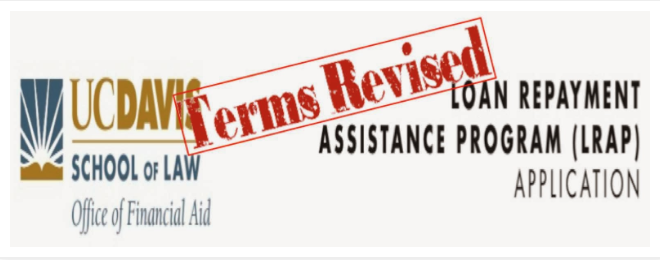
King Hall Budget Policy Committee
Blog Editors
Recent Posts
Letter to Alumni Re-introducing the King Hall Budget Policy Committee
Petition for the Loan Forgiveness Program
Archive
2014
Town Hall 2014
Posted By Shelley Jiang, Mar 5, 2014
 Now posted on the Intranet and pending an external link for alumni is the video recording of today's town hall meeting regarding the current LRAP terms and proposed changes. The proposed changes will likely be adopted by LRAP Committee sometime this year. If the LRAP terms are changed in advance of November 2014, then the graduating class of May 2014 will be offered the new LRAP. Otherwise, graduates will be offered the old LRAP.
Now posted on the Intranet and pending an external link for alumni is the video recording of today's town hall meeting regarding the current LRAP terms and proposed changes. The proposed changes will likely be adopted by LRAP Committee sometime this year. If the LRAP terms are changed in advance of November 2014, then the graduating class of May 2014 will be offered the new LRAP. Otherwise, graduates will be offered the old LRAP.
Graduates will have the option of applying for LRAP (Loan Repayment Assistance Program) within 3 years of their graduation date. Thus, anyone graduating May 2014 and afterwards will likely be faced with the new LRAP terms... which are still being ironed out***. Today, Dean Kulwin has shared with us some key differences between old and new LRAP, which are better referred to in her chart in the video. From memory, some changes include:
***The major problems caused by benching LRAP installments on FPSLFP are that graduates will experience negative amortization of their school loans. That is, loan repayments (sum of the graduate's income-based repayment + income-based LRAP installment) will not actually be enough to pay off any principal on the loan. At some salary levels, the loan repayments won't even be enough to pay off that month's interest on the loan. Therefore, your unpaid interest rolls into the principal owed for the next month. Cycle continues and your principal just keeps escalating and you end up with more debt than you started out even trying to repay.
Best case scenario: If you kick this can down the road long enough to make good on your 120 repayments to federal gov., then FPSLFP will forgive your education debt. However, even if you carry 10 yrs. of debt and never pay taxes, the 10 yrs. of debt and outstanding debt hurt your credit history and make it difficult for purchasing a car, home, etc.
Worst case scenario: if you don't make the 120 repayments due to changed circumstances, then you're laden with debt and disqualified from LRAP and/or FPSLFP.
These LRAP proposed changes are tabled for at least another 2 weeks in order to collect feedback and suggestions before the proposed changes go to LRAP Committee for discussion. Dean Kulwin is getting a special inbox just to handle comments about the town hall and LRAP proposed changes. I will give updates once that email address is shared.
Please do draft concerns and suggestions for the LRAP Committee to take into consideration!
Also, it was noted by Dean Kulwin that most graduates who enrolled in LRAP seem to have dropped out after 3 years of participation. Few gave reasons for not continuing in LRAP and the ones who did cited:
Please comment with what other problems you have faced or that made you stop LRAP so that the LRAP Committee can attend to these problem areas! If you stopped participating in LRAP, is it for over 2 yrs. or without intent/ability to resume LRAP?